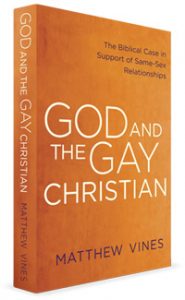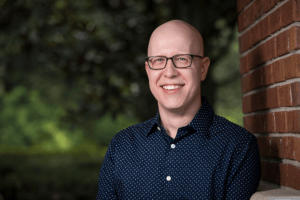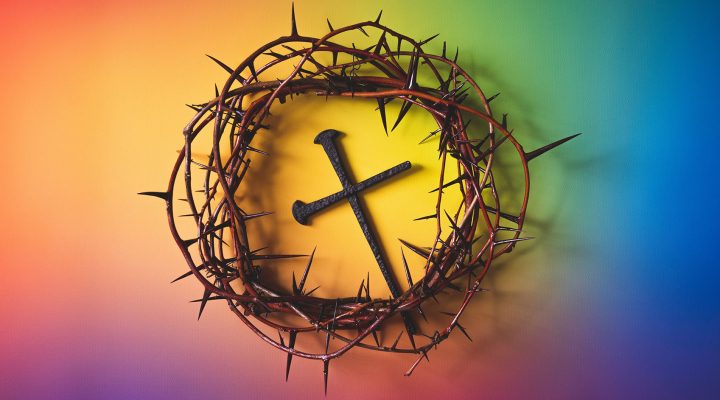When it comes to debating LGBTQ inclusion in the church, most folks think the debate is only about whether gays and lesbians can be Christians and whether they and their B, T and Q cohorts should be allowed full participation in the church.
But that’s only the beginning. Inside the world of affirming Christians lies another big debate — actually, several debates — about where and if to draw any lines. Two of the most prominent views on the bigger debate are articulated by two gay men who have come out of evangelical Christianity: Matthew Vines and Brandan Robertson.
 For the past decade, since publication of his book God and the Gay Christian, Vines, 33, has been a proponent of a kind of orthodox Christianity that also sees homosexuality as part of God’s creation and same-sex marriage as allowable within reasonable biblical interpretation. The six so-called “clobber passages” in the Bible — the ones most often used to condemn same-sex relations — do not have to be read in the traditional limiting way, he says.
For the past decade, since publication of his book God and the Gay Christian, Vines, 33, has been a proponent of a kind of orthodox Christianity that also sees homosexuality as part of God’s creation and same-sex marriage as allowable within reasonable biblical interpretation. The six so-called “clobber passages” in the Bible — the ones most often used to condemn same-sex relations — do not have to be read in the traditional limiting way, he says.
Robertson, 31, is a gay writer, LGBTQ activist, Christian minister and TikTok influencer who is an occasional columnist for BNG. He sees the debate as about much more than how to interpret six passages in the Bible; in his view, prohibiting same-sex relations is only one thing the traditional church has gotten wrong.
First, a little history
Although debate about LGBTQ inclusion in the church has a long — and mainly oppressive — history, things really heated up in the United States in 2015 when the U.S. Supreme Court ruled that same-sex marriage must be recognized in all 50 states. This moved churches and pastors from the easy excuse of saying, “Well, it’s against the law,” to having to give better reasons for their beliefs.
Many progressive pastors and churches began digging into their belief systems, looking for resources and articulating positions either for or against same-sex marriage. Vines’ book had been published just one year before and became a go-to resource for many Christians genuinely exploring the biblical evidence anew.

Justin Lee (Photo/Baylor)
Long before the Supreme Court ruling, in 2001, Justin Lee launched an online community to support gay Christians. In time, that community morphed into a national organization called the Gay Christian Network. GCN held conferences and gathered people online and in person for learning and fellowship.
Lee and GCN defined two types of gay Christians: “On one side are those who are in gay relationships or hope to be some day. On the other side are those who view their same-sex attractions as a temptation and strive to live celibate lives. We call these views Side A and Side B.”
The label of “Side B Christians” gave voice to a group of sincere believers who realized it was not their choice to be gay or lesbian but determined the Bible directed them not to act on those sexual desires.
“Side A Christians” included those who sought same-sex relationships either in committed monogamous relationships or otherwise.
Later, another category called “Side Y” emerged which acknowledges same-sex attraction but does not affirm it.
By 2017, Justin Lee and the board of GCN parted ways, and the group rebranded itself as Q Christian Fellowship. Today, the group is primarily known as QCF.
In 2013, Vines had launched The Reformation Project as an outgrowth of his writing and subsequent speaking. He attended Harvard University from 2008 to 2010, when he took a leave to research and write his book. The Reformation Project offers a robust schedule of educational groups, support groups, conferences and publications.
Other than being a gay man now married to another man, Vines defies the stereotypes of gay-affirming theology. He quotes the Bible freely and regularly and defends the Bible like an orthodox pastor.
Vines defies the stereotypes of gay-affirming theology. He quotes the Bible freely and regularly and defends the Bible like an orthodox pastor.
While Vines was raised in a Presbyterian church in Kansas, Robertson came to faith as a 12-year-old in a Baptist church in Maryland. He found his way to Moody Bible College, a decidedly conservative and non-affirming institution.
The same year he graduated with a bachelor of arts degree, he was named national spokesman for Evangelicals for Marriage Equality and convened a meeting between Southern Baptist leaders and LGBTQ Christians.
In 2017, he earned a master’s degree from Iliff School of Theology, a Methodist school in Denver, and became pastor of a Disciples of Christ church in San Diego. Having added a master of arts degree in political science from Eastern Illinois University and currently engaged in Ph.D. work at Drew University, he recently was called as pastor of Sunnyside Reformed Church in Queens, N.Y., an interdenominational congregation affiliated with both the Reformed Church in America and the United Church of Christ.
These two men — both young gay Christians with national influence — represent one of the most interesting debates within the affirming Christian community today. Understanding their differences begins with the use of one word: “Queer.”
Against queer theology
Recently, The Reformation Project posted an article on its website titled “Reform vs. Revolution: Distinguishing Affirming Theology from Queer Theology.” That article echoes a speech given by Vines at his organization’s Reconcile and Reform Conference in Nashville, on Oct. 27, 2023. The title of that hour-long speech was “Expressive Individualism, Queer Theology, and Our Identity in Christ.”
He began the speech expressing “concern that our culture has begun to develop an unhealthy emphasis on individual identity.”

Matthew Vines
Among those is the mantra to “live your truth,” he said, noting some people come out by saying they are “owning their truth” and being their true selves finally.
“The challenge with this phrase really is the second word, the word as in ‘your truth,’ the idea that there is such a thing as individual truth, that somehow you might have a truth, I might have a truth, they might not be the same,” he explained.
From a Christian standpoint, he argued, there cannot be two truths. “This phrase often raises a red flag for many Christians because it sounds like a challenge to the concept of objective truth, whether that’s the intention behind it or not.”
Vines also addressed the modern notion of “expressive individualism,” quoting the late Presbyterian pastor Tim Keller’s descriptions and warnings about individualism run amok. He then tied expressive individualism to the sexual revolution and spoke of the dangers of being driven by desire.
The sexual revolution is not synonymous with the LGBTQ community, Vines said.
The sexual revolution is not synonymous with the LGBTQ community, Vines said. “I recognize this absolutely is a common philosophy. I don’t think this is the only way people could develop an affirming position. This has certainly not been the basis of the affirming argument I’ve been putting forward or The Reformation Project has been putting forward.”
With that background, Vines moved to the main point of his message: defining and refuting “queer theory” as a theology.
He described queer theory as “an academic field of study that focuses on challenging norms related to gender and sexuality.” He charged that in this construct, the word “queer” means “non-normal.”
And that’s not what most LGBTQ people today — especially younger people — want, Vines said. “Most younger people today, or people of any age who identify as queer, actually do want to be seen and treated as normal. They just don’t want to be discriminated against on the basis of their identity or their sexual orientation.”
Modern debate over queer theory “reflects a division you can find in almost every social change movement throughout history, and that is the division between the path of reform and the path of revolution,” he said. “And by reform I don’t mean small change versus big change with revolution. By reform, I mean making change within an existing institution to make it better. … Whereas revolution is saying, actually, the institution should kind of just be razed to the ground so we start over altogether, a complete rupture from where we started, not an interest in inclusion, but an interest in revolution.”
The Reformation Project has staked its claim in its name, he quipped. “We’re not The Revolution Project.”
“We’re not The Revolution Project.”
Queer theory represents “more of the revolution side of the spectrum,” he said.
That influences the church through “queer theology,” he continued. “Queer theology then is simply the application of the field of queer theory to theology.”
Vines called such theology “transgressive.” He quoted numerous theorists and authors and ultimately warned that in some cases queer theology allows theory to influence theology more than allowing theology to influence identity.
In some cases, that can lead to acceptance of communal sex, non-monogamous sex, “sex in the park” and more, he said. “Most affirming Christians look at this and say, ‘That’s not how we’re called to live as Christians.’”
Some queer theology tries to make the biblical characters Ruth and Naomi lesbians and David and Jonathan gay lovers, he indicated. “You’ll often hear in the field of queer theology and queer theory that we should use a queer lens for interpreting things and in theology for interpreting the Bible.”
Looking for “anything you can make queer” is “typically not going to lead to the best biblical interpretation.”
He continued: “I don’t think David and Jonathan were a same-sex couple. I don’t think Ruth and Naomi were a same-sex couple. There are some great things in those stories, but I think oftentimes people are engaging in anachronisms maybe in an effort to try to feel represented, but that’s just not the best approach to biblical interpretation. We don’t need to rely on those sorts of arguments. We can rely on arguments that are exegetically and historically sound. But if you’re trying to take a queer lens, you’re much more likely to read into things that aren’t really there. You’re much more likely to end up reaching and making arguments that then cause people to question your objectivity and credibility in your discussion of Scripture because it felt like you were trying to force something that didn’t fit.”
“If you’re trying to take a queer lens, you’re much more likely to read into things that aren’t really there.”
Acceptance of same-sex relationships does not require the church to stop talking about sexual morality altogether, he urged. This mirrors the position he and The Reformation Project have taken in advocating for monogamy in sexual relationships whether homosexual or heterosexual.
“My argument is that we don’t need to queer the Bible. We just need to interpret it more accurately and faithfully. We don’t need to queer the church. We just need the church to foster greater inclusion, love, embrace and acceptance of LGBTQ people.”
The big truth of the Bible, Vines said, is God’s love for all people. “Whether you are gay or straight, whether you are bisexual or transgender, … this is the deepest truth about you.”
God’s unconditional love “is the truest truth about you, and this is why Paul says in Galatians we should not boast except in the cross of our Lord Jesus Christ, through which the world has been crucified to me and I to the world.”
Another view
Robertson takes exception with Vines’ speech. In an opinion piece submitted to BNG titled “Our Theology Must Be Queer, Or It Will Be Harmful,” he writes: “On my own journey as a queer Christian, I realized early on the problem wasn’t merely that six verses of the Bible have been misinterpreted (although they have), but that the entire paradigm of evangelical theology was untrue and oppressive from the ground up.”
He believes Vines’ “affirming theology” does not go far enough.

Brandan Robertson
“For instance, the way evangelicals define God is itself a problem — a traditional evangelical version of God as a divine patriarch, with a very limited capacity for creativity and very low tolerance for diversity. The way evangelicals view the Bible — as the divinely dictated and inerrant word of God — is ahistorical and results in evangelicals arguing for our modern ethics and beliefs to reflect that of the first century world, despite many of those standards being gravely deficient and responsible for unnamable abuse and oppression throughout history.
“And the evangelical doctrines of sexuality and relationships are likewise rooted in ancient patriarchal standards that do not consider the broad diversity of sexuality, gender expression and possibilities for intimate relationships that can be just as ethical and life-giving as life-long monogamy.”
Robertson says he understands why many LGBTQ Christians begin their journey to reconcile faith and sexuality with the approach Vines offers. “When your entire understanding of Christianity has been shaped in an evangelical or traditional Christian environment, it can be helpful to see another queer person affirming that view of theology while also suggesting there are better ways to understand the clobber passages that don’t require you to rethinking biblical authority.”
Then he adds: “But the truth is that very few LGBTQ Christians maintain this posture for a long time. Because when you realize how wrong the church has gotten something as basic as interpreting six verses of Scripture on same-sex sex, you can’t help but wonder what else the church might be wrong about. And when you begin to study the history of anti-LGBTQ sentiment in Christianity, you quickly begin to see there are much larger theological issues that provided the foundation for anti-LGBTQ Christian theology to flourish.”
“When you realize how wrong the church has gotten something as basic as interpreting six verses of Scripture on same-sex sex, you can’t help but wonder what else the church might be wrong about.”
Thus, many queer Christians “begin to rethink the whole of their faith and often end up embracing a much queerer version of Christianity that centers the very people Jesus himself centered: the marginalized and oppressed.”
The fears “affirming Christians” have about queer theology causing “the powerbrokers of the Christian church to turn away from the plight of LGBTQ people and double-down on their non-affirming beliefs” are right, Robertson says. “Most of those evangelical leaders believe I’ve gone way too far and have little interest in hearing the perspectives of queer Christians who are not willing to conform to their theology and traditions.”
He declares: “Authentic Christianity is queer Christianity. Queerness, in this context, is used as the posture of skepticism toward norms, a willingness to be creative in our articulation of our theology and practice, and a fundamental belief in an eternally expansive Creator that cannot be confined by any creeds, dogmas or traditions. A queer Christianity is one that questions the so-called authorities who produced what we know as ‘traditional Christianity’ and seeks to listen for the voices of those who were silenced by those authorities, convinced that the truth is ultimately found not among the privileged or powerful, but the ones whom the privileged and powerful have sought to silence.”
He also says: “To draw a line in the sand and declare oneself against queer theology is to situate yourself among the powerful and the privileged, where you are sure to miss the true work of the Spirit of God, which is never to be found in such a place.”
Other reaction for and against
Right now, “queer theology” is all over social media. Search for the phrase on X or Tik-Tok and find hundreds of results ranging from the far right to the far left.
Another sign of the significance of the debate is the increased use of the word “queering” as a verb.
Vines and Robertson are only two of many voices discussing these ideas within Christianity. While there is debate over degree of meaning among those who affirm LGBTQ Christians, the work of queer theory often gets cited by non-affirming Christians as a reason for their disdain.
Recent research shows high levels of religious identity by LGBTQ Americans, even if those people have been rejected in their own churches. That is lower than the religious identity expressed by heterosexual Americans of the same age.
However, as with all Americans, religious affiliation expressed by younger generations of the LGBTQ community is decreasing every year.
While older generations of gays and lesbians may have grown up in a church that cast them out for being queer, younger generations have no church to leave and indicate little interest in entering spaces where they do not believe they will be welcome — whatever their theology.


